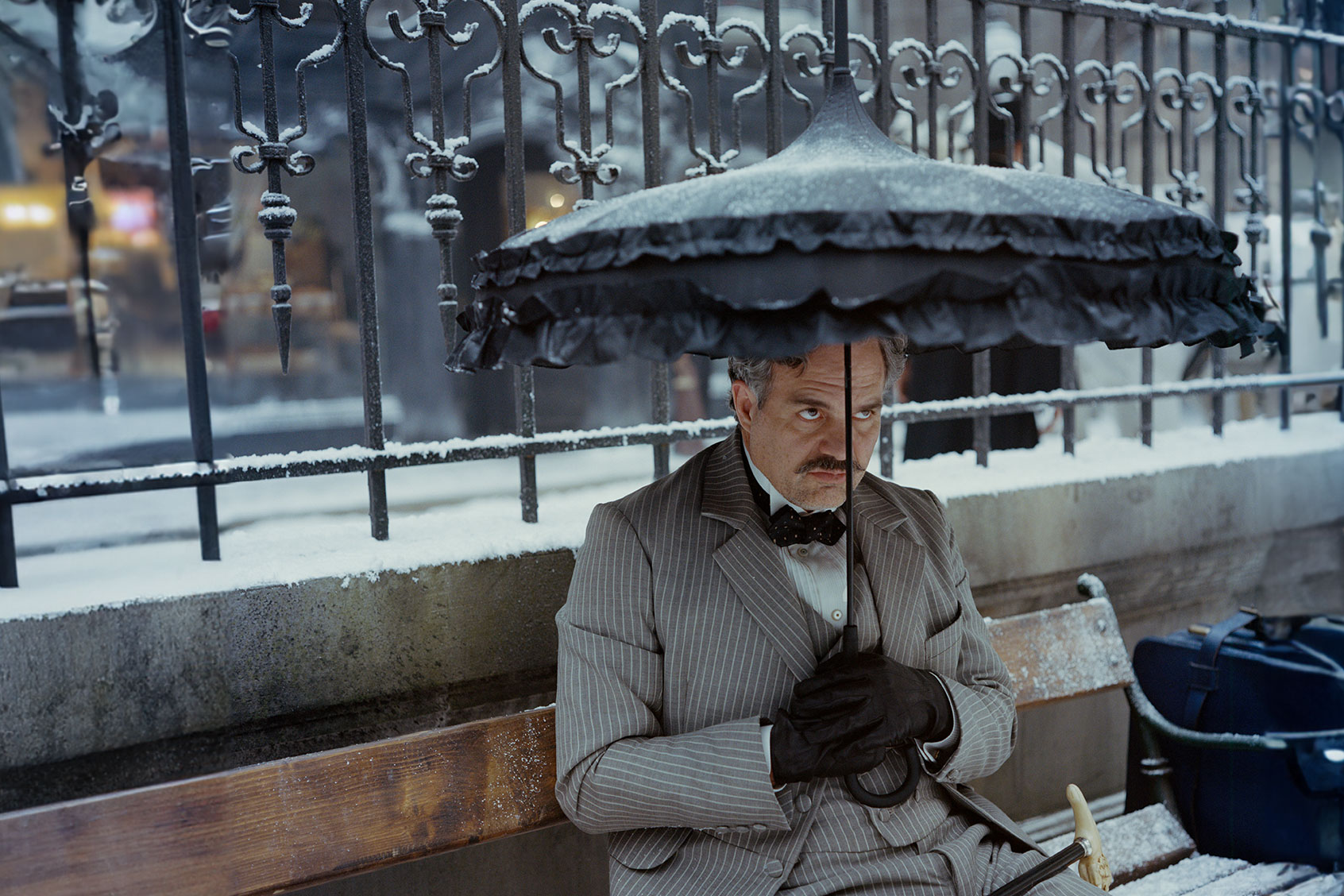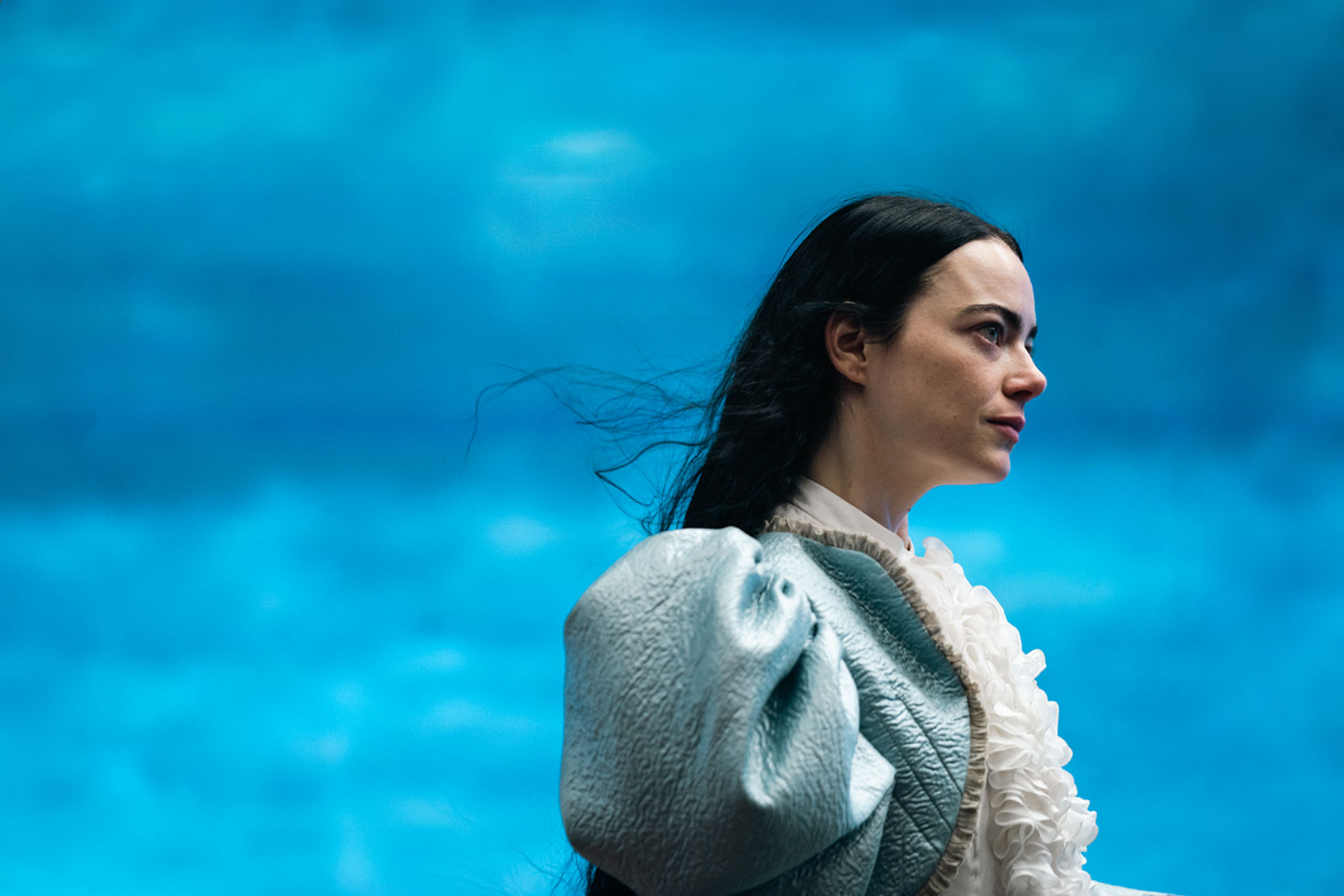The first reel of Yorgos Lanthimos’ latest cinematic masterpiece, “Poor Things,” is shot largely in black and white and with a fish-eye lens. It features several WTF moments and sight gags, which prompt viewers to embrace its prickly charms. This no-hold-barred film will take viewers on a weird, wild and wonderful journey that is simultaneously funny, feisty and feminist.
The real strength of the film is Stone’s fearless performance.
Bella Baxter (Emma Stone) is seen early on (in a color sequence) dying by suicide. Her corpse is soon reanimated by God(win) (Willem Dafoe in mad scientist mode, complete with Frankenstein-ian facial scars), but she has the mind of a child. Bella behaves erratically, breaking plates, screaming and having tantrums. Stone is remarkable in these early scenes acting out physically, and her performance only gets more astonishing as the film progresses. Like Lanthimos, Stone is only just getting started. Meanwhile, God absurdly burps bubbles.
Since Bella needs to have someone monitor her progress as she learns language and motor skills, Godwin asks one of his students, Max McCandles (Ramy Youssef), to be a companion for her. Godwin has kept Bella shielded from society, but when Bella gets a taste of life outside — Lanthimos has depicted the impact of seclusion from society since his brilliant breakout film, “Dogtooth” — she becomes hungry for adventure. Despite becoming engaged to Max, Bella runs off with Duncan Wedderburn (Mark Ruffalo), a handsome cad, shortly after discovering how to pleasure herself in a rather . . . resourceful way.
“Poor Things” takes off at this point in ways that astound and amuse. The plot borrows heavily from “Pygmalion,” “Frankenstein” and “Prometheus” among other narratives. Duncan thinks he can control Bella, and they initially exhaust each other with copious bouts of sex. Well, Duncan is fatigued; Bella keeps wanting more, such is her insatiable appetite for carnal knowledge.
 Mark Ruffalo in "Poor Things" (Atsushi Nishijima/Searchlight)
Mark Ruffalo in "Poor Things" (Atsushi Nishijima/Searchlight)
Bella also wants intellectual knowledge. Her speech is also something to behold as she talks in ways that are initially simple, even backward, but soon grow more complex as she becomes more worldly. One of the funniest lines has her declaring what she must do to quiet a noisy infant. Hilarity also ensues when Duncan and Bella dance, moving their bodies in ways the defy nature and logic. (A hallmark of Lanthimos’ films are wacky dance sequences, and “Poor Things” does not disappoint.)
But Bella starts to irritate Duncan, who “kidnaps” her, taking her on a ship that blows green and yellow smoke in one of the film’s many imaginative touches. Equally inventive are the eye-popping costumes; Bella often wears dresses that look like they have been stolen from Bjork’s closet. Duncan, in contrast, is outfitted in fabulous dapper suits.
Aboard the ship, Bella soon meets Martha (Hanna Schygulla) and Harry (Jerrod Carmichael). She starts to learn philosophy from Harry, which further frustrates Duncan, who wants her to be docile. As Bella gains knowledge, Duncan becomes more controlling and enraged by her autonomous actions. His rants are hilarious, and Ruffalo’s mugging is a comic highlight. The actor can wring laughs by revealing his incredulity at Bella’s behavior; his expressions of shock are priceless. Watching Ruffalo process what Bella has done provides a giddy pleasure, especially when he deadpans, “Oh,” or “Bella!” because he expresses so much emotion in a single word response. The actor gives what may be a career best performance here.
It is, arguably, the best film of the year.
Ashore and broke, Bella turns to Swiney (Kathryn Hunter from “The Tragedy of Macbeth”), a brothel owner, to both earn money and fulfill her insatiable need for sex. This further infuriates Duncan, and his rants get even more outrageous and more outrageously funny. Bella, meanwhile, continues to become more feminist, even asking Swiney if the women can choose the male customers that they want to have sex with, rather than the other way round — since it would only please the man to have been selected by someone who has enthusiasm to service them. Her logic is hardly cockeyed.
 Poor Things (Searchlight)
Poor Things (Searchlight)
“Poor Things” is always canny, from its fantastic world-building, which includes the cavernous spaces of Godwin’s mansion, to the odd-looking ships flying in the sky, to the Art Deco style of the ocean liner and more. The film's visuals are extraordinary and look like something Terry Gilliam mighty create in his fantasy worlds.
Lanthimos’ cheeky, quirky approach also makes the film so enjoyable. He pitches the humor both broad and dark with slapstick-y bits involving dragging bodies and surrealist touches, like hybrid animal experiments. The clever script, by Tony McNamara, who adapted Alasdair Gray’s novel, is chock-full of quick-witted wordplay. Bella’s absurdist language is wonderfully subversive, and Stone’s halting, wide-eyed, deadpan delivery of her lines — as if she is working things out as she says them — adds pizzazz.
Want a daily wrap-up of all the news and commentary Salon has to offer? Subscribe to our morning newsletter, Crash Course.
The real strength of the film is Stone’s fearless performance. She shows an incredible flair for physical comedy, as when she plays the piano with her feet in one scene or dances. Stone makes Bella a manic pixie dream girl who bewitches Max and Duncan (as well as others). She portrays Bella’s transformation with a mix of guile, awareness and cunning. The feminist themes are also prominent as Bella (and other women) often get the best of the men. Watching Bella reduce various gentlemen to quivering hair-pullers or braying animals is quite delightful.
“Poor Things” is smart and bonkers in all the right ways. This is why it is, arguably, the best film of the year.
“Poor Things” opens theatrically nationwide Dec. 8.
Read more
reviews by Gary Kramer


